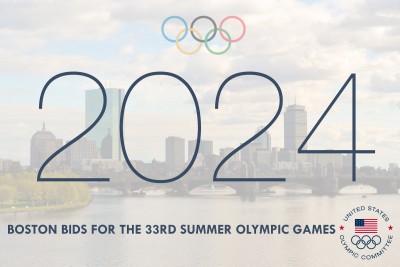The Boston 2024 Executive Bid Committee has agreed to release bid documents to the public and hold Citizen’s Advisory Meetings to allow for transparency in the Olympic bid process, according to the Boston 2024 website.

On Jan. 8, the United States Olympic Committee selected Boston as the U.S. bid for the 2024 Summer Olympics. The following day, Boston Mayor Martin Walsh said at a press conference that there would be “no referendum.”
On Tuesday, Laura Oggeri, chief communications officer for the City of Boston, clarified in a statement that Walsh does not support a referendum on the Boston 2024 bid decision, but he does not look to discourage conversation.
“He looks forward to engaging in a robust community process and having a two-way conversation with all neighborhoods as we move forward,” she said in a Tuesday statement. “Should the public decide to collect signatures for a referendum, that is a right of the people that the mayor fully supports.”
Even before the city was officially announced as the U.S. bid, there had been public unrest over the potential of having the 2024 Olympics in Boston. On Dec. 9, The Daily Free Press reported that a group of approximately 30 individuals gathered outside the Institute of Contemporary Art/Boston to protest the potential Boston hosting.
Chris Dempsey, co-chair of the 2024 bid-opposing organization , said the improvements to the city that would need to be completed to host the Olympics could be done without the motivation of the Games.
“If you look at previous Olympics hosts, a lot of them have made a lot of promises in their bid about the infrastructure they would improve,” he said. “But when the rubber hits the road, what the International Olympic Committee cares more about is getting stadiums and venues done rather than fixing the Red Line or getting better buses.”
Adam Naylor, a clinical psychology professor in Boston University’s School of Education, said the psychological effects of hosting an Olympics might be more interesting than the financial repercussions.
“There’s no doubt sports can bring communities together, add excitement and add good feelings,” he said. “There’s a lot of science to say that when people cheer together, they come together and there’s positive emotions, and some studies have shown that there’s some positive mental health benefits.”
With the release of the bid documents, Naylor said there will be more transparency between the Boston 2024 committee and the public, which could quell conflict between spectators and athletes.
“Especially in high-end sports these days, there are so many conspiracy theories, and the less we can have those, the better for the athletes, the fans, organizations,” he said. “Transparency gives people a lot more comfort with the process for better or for less.”
Frank Shorr, a professor in the College of Communication, said there are issues aside from money and stadium construction that affect the success of the Boston 2024 bid.
“People forget that the city of Boston has a population of about 750,000, and as much as it is a really cosmopolitan city and a city that people flock towards, it’s very small,” he said. “Getting around and trying to move from place to place is the major hurdle in getting the bid.”
Boston is no stranger to hosting large-scale events. Shorr mentioned the Democratic National Convention that was held in Boston in 2004, the World Series in 2013 and the Boston Marathon that takes place each year.
“This is something different in terms of geography, in terms of sports and venues and much more wide reaching,” he said. “But it’s not like we’ve never done this before. Certainly, yes, we’ve never done the Olympics before, but it’s not like we’ve never held a big event.”
Robert Volk, a professor in the School of Law, was living and working in London during the 2012 Summer Olympic Games and witnessed the effects of the games on the city.
“The Olympics could be beneficial to the city if they’re done right,” he said. “The Olympics in London left the city with a big new park, new athletics facilities and better transportation options. If that happens to Boston, that would be great.”
Volk said releasing bid documents to the public is helpful in building a strong presentation to the IOC.
“People should know what the plans are and have input into the plans so if something doesn’t seem to work, they can be modified somewhat,” he said. “The citizens of the area need to have input.”
Several residents said the possibility of the Olympics was promising, but they could see it posing some issues for the city.
Erica Meninno, 25, of Jamaica Plain, said the Olympics would bring a lot of excitement to the city.
“I honestly haven’t given it a ton of thought, but it seems like space would be a restriction in Boston,” he said. “Although, I think the city of Boston would have a lot of excitement around having an Olympics given that it’s such a sports-oriented city.”
Albert Parks, 21, of Allston, said the transit system could pose a problem in organizing a strong Olympic Games.
“They could pull it off, considering there are already so many people in the city,” he said. “[But] when it comes to the T and bus system, the city is not very strong in being able to host that many people.”
Laurel Anderson, 33, of Brighton, said proper planning could help alleviate issues raised by anti-Olympics organizations.
“It’d be really exciting,” she said. “It would be really nice for the city and its residents. However, I know we’re not even able to accommodate bicycles in the lanes. It is a little worrisome, but I would hope that with planning, they could figure it out.”


















































































































